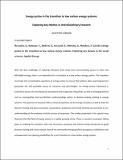Files in this item
Energy justice in the transition to low carbon energy systems : exploring key themes in interdisciplinary research
Item metadata
| dc.contributor.author | McCauley, Darren Andrew | |
| dc.contributor.author | Ramasar, Vasna | |
| dc.contributor.author | Heffron, Raphael | |
| dc.contributor.author | Sovacool, Benjamin | |
| dc.contributor.author | Mebratu, Desta | |
| dc.contributor.author | Mundaca, Luis | |
| dc.date.accessioned | 2019-11-03T00:37:12Z | |
| dc.date.available | 2019-11-03T00:37:12Z | |
| dc.date.issued | 2019-01-01 | |
| dc.identifier | 256451107 | |
| dc.identifier | 7af83afb-5415-4eb4-9532-b060bc815b1b | |
| dc.identifier | 85055870953 | |
| dc.identifier | 000454376900069 | |
| dc.identifier.citation | McCauley , D A , Ramasar , V , Heffron , R , Sovacool , B , Mebratu , D & Mundaca , L 2019 , ' Energy justice in the transition to low carbon energy systems : exploring key themes in interdisciplinary research ' , Applied Energy , vol. 233-234 , pp. 916-921 . https://doi.org/10.1016/j.apenergy.2018.10.005 | en |
| dc.identifier.issn | 0306-2619 | |
| dc.identifier.uri | https://hdl.handle.net/10023/18834 | |
| dc.description | In terms of funders, we would like to acknowledge the Pufendorf Institute for Advanced Studies at Lund University as well as the St Andrews Sustainability Institute, School of Geography and Sustainable Development, University of St. Andrews for their financial support in this initiative. | en |
| dc.description.abstract | With the dual challenges of reducing emissions from fossil fuels and providing access to clean and affordable energy, there is an imperative for a transition to a low carbon energy system. The transition must take into consideration questions of energy justice to ensure that policies, plans and programmes guarantee fair and equitable access to resources and technologies. An energy justice framework is outlined to account for distributional, procedural and recognition inequalities, as well as emerging themes such as cosmopolitan and non-Western understandings of justice, in decision-making relating to energy systems. The spectrum of research offers critical perspectives on the energy transition as well as tools for decision-making and policy processes. Quantitative, qualitative and mixed methods all contribute to our understanding of the problems and the success of responses. The studies presented in this special issue illustrate that the field of energy justice is a rapidly growing arena. There is constant innovation taking place in enabling the transition with new structures, processes and metrics being introduced to guide decision-making and a more holistic view of the community emerging where acceptance, mobilisation and empowerment are opening possibilities for a just transition to a low carbon energy system. The importance of introducing the interdisciplinary approach between social sciences and natural sciences as well engineering implementation supported by scientific data and experiments shall be emphasized in future studies. | |
| dc.format.extent | 6 | |
| dc.format.extent | 761006 | |
| dc.language.iso | eng | |
| dc.relation.ispartof | Applied Energy | en |
| dc.subject | Energy justice | en |
| dc.subject | Distributional justice | en |
| dc.subject | Procedural justice | en |
| dc.subject | Just transition | en |
| dc.subject | Whole energy systems | en |
| dc.subject | Low carbon | en |
| dc.subject | Interdisciplinary energy research | en |
| dc.subject | G Geography (General) | en |
| dc.subject | HD Industries. Land use. Labor | en |
| dc.subject | T-NDAS | en |
| dc.subject | SDG 7 - Affordable and Clean Energy | en |
| dc.subject | SDG 15 - Life on Land | en |
| dc.subject.lcc | G1 | en |
| dc.subject.lcc | HD | en |
| dc.title | Energy justice in the transition to low carbon energy systems : exploring key themes in interdisciplinary research | en |
| dc.type | Journal article | en |
| dc.contributor.institution | University of St Andrews. School of Geography & Sustainable Development | en |
| dc.identifier.doi | https://doi.org/10.1016/j.apenergy.2018.10.005 | |
| dc.description.status | Peer reviewed | en |
| dc.date.embargoedUntil | 2019-11-03 |
This item appears in the following Collection(s)
Items in the St Andrews Research Repository are protected by copyright, with all rights reserved, unless otherwise indicated.

